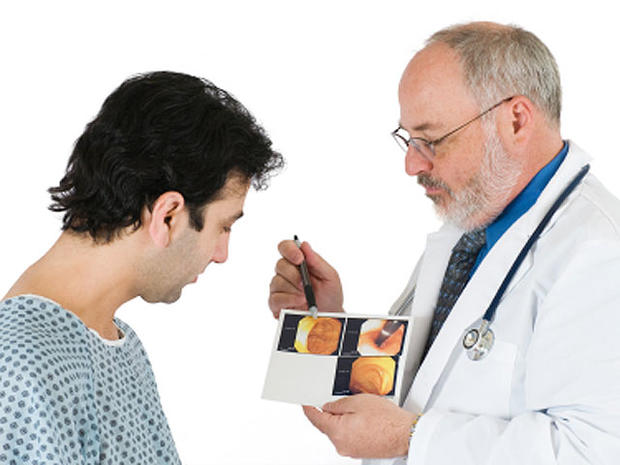Colorectal cancer death risk cut in half through colonoscopies, study shows
(CBS/AP) Dread having a colonoscopy? A new study shows the colon exam cuts death risk from colon cancer in half. The study is the first to offer clear evidence that the exam, avoided by many who find it uncomfortable or embarrassing, is worth it.
PICTURES - 10 myths about colon cancer
The exam helps doctors spot precancerous growths, and removing those polyps significantly improves cancer survival, the study found.
During a colonoscopy, a thin, flexible tube with a tiny camera is guided through the large intestine. Growths can be snipped off and checked for cancer. Patients are sedated, but many avoid the test because of the unpleasant steps needed to get ready for it. Patients have to eat a modified diet and drink solutions the day before to clear out the bowel. It usually costs more than $1,000, compared with a $20 stool test.
"Sure, it's a pain in the neck. People complain to me all the time, 'It's horrible. It's terrible,'" said Dr. Sidney Winawer, a gastroenterologist at Memorial Sloan-Kettering Cancer Center in New York who helped lead the study. "But look at the alternative."
The new study followed 2,602 patients who had precancerous growths removed during colonoscopies for an average of 15 years. Their risk of dying from colon cancer was 53 percent lower than what would be expected among a similar group in the general population - 12 patients followed in the study died, versus 25 estimated deaths in the general population.
"There's no question that these are findings that we can take to the bank," said Robert Smith, director of screening at the American Cancer Society, who noted that the study was not a randomized trial that's the gold standard in medical research.
A second study in Spain found that colonoscopies did a better job of finding polyps than another common screening tool - tests that look for blood in stool. About 53,000 participants were given a colonoscopy or a stool blood test. Both tests found similar numbers of colon cancer cases, but colonoscopies found advanced growths in twice as many people - 514 versus 231 of those given the stool test. Colonoscopy also found 10 times more people with less serious growths than the stool test did.
Both studies were published in Thursday's New England Journal of Medicine.
Deaths from colorectal cancer have been declining for more than two decades, mostly because of screening including colonoscopies and other tests, the organization says. People ages 50 to 75 are most likely to get colon cancer, but only about half in the U.S. get screened.
A colonoscopy is only necessary once a decade, experts say. Alternative methods of screening include annual stool blood tests or a sigmoidoscopy (scope exam of the lower bowel) every five years with stool tests every three years, according to a government-appointed panel.
Colorectal cancer is the second leading cause of cancer death in the United States and the fourth worldwide. More than 143,000 new cases of cancers of the colon or rectum are expected in the U.S. this year and nearly 52,000 people will die from it, according to the American Cancer Society.
The Mayo Clinic has more on colon cancer.

